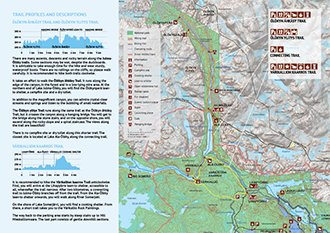Hossa Värikallio Rock Paintings

The spot is managed by Metsähallitus.
The Hossa Värikallio rock paintings are amongst the largest prehistoric rock paintings in Finland. The pictures on the rock wall rising from Lake Somerjärvi were painted in the Stone Age, i.e. about 3,500 - 4,500 years ago.
Rock Paintings - Tales from across the Ages
The rock paintings are located along a water route that was used in ancient times. They were painted from a boat or when standing on the ice of the lake. On the surface of the rock wall there are 61 separate figures depicting scenes of hunting and shamanic rituals. The paintings have probably been used for marking a route or describing events. These paintings were officially found in 1977.

Routes and Hunting Magic
In ancient times, Hossa was a junction for water routes. The routes reached as far as the Gulf of Bothnia in the west and the White Sea in the east. Consequently, it is possible that the Värikallio pictures were used for marking a route or describing events. The painted rock walls found in Finland are usually located along major water ways. At Värikallio, as by several other painted rock walls, there is a strong echo.
The pictures in rock paintings are usually linked to hunting magic. Painted rock walls could also have functioned as cult places of shamanic worship. In the Hossa paintings, a human figure with antlers on its head or dressed as an animal frequently appears. These human figures may portray a witch or a shaman, as a headpiece with antlers was part of a witch's dress, at least later in times, amongst the arctic hunting peoples. Pictures may also have been painted in order to guarantee fertility. According to Pekka Kivikäs, who has studied Finnish prehistoric rock paintings, many of the human figures portrayed in Värikallio may be women, some of them in labour.
The Hossa Värikallio rock paintings are different from the other prehistoric paintings in Finland. The small, stick-like elk figures are not actually known elsewhere, and the human figure with a triangle-shaped head, eyes and nose is unique. It is exceptional that there are no boat pictures in Värikallio.
The pictures found in Finland dating from the Stone Age have been painted. There are no drawings engraved in rock in Finland. Red and yellow ochre were used as colouring agents, which were obtained by heating iron-bearing clay. Blood, grease or egg yolk has been used as the mixing agent.
Opening Hours and visiting
- Värikallio is accessible all year round.
- The access to the paintings is free-of-charge. Theme guiding for groups is subject to a charge.
- There are no personnel on the Värikallio Cliffs.
- In summer there is a trail leading to the paintings, and an observation platform has been built in front of the cliffs. The walking bridge with a platform is made of steel so it's safe to walk to see the rock paintings quite closely.
- In winter there is a wilderness track to the cliffs.
Contact Information
For more information on Värikallio Cliffs contact Hossa Visitor Centre.
Directions and Maps
Värikallio Cliffs are situated in the Hossa National Park, on the shore Lake Somerjärvi.
By Car
- From the Hossa Visitor Centre, drive for about 3 km along the Jatkonsalmentie road, then turn on to the sandy road leading to Pisto. Drive for about 7 km and turn on to the road that leads to the Lihapyörre parking area (2 km). The Värikallio Cliffs Trail starts from the parking area. This circle trail is 8 km long.
- In winter you can go skiing from the Umpi-Valkeinen parking area: from the Hossa Visitor Centre, turn left and drive for about 3 km along the Jatkonsalmentie road. Turn on to a road leading to Pisto and drive for about 4.5 km. The skiing trip from the Umpi-Valkeinen parking area to Värikallio and back is about 13 km.
By Public Transportation
- The Värikallio Cliffs cannot be reached by public transport. The closest bus stop is located by the Hossa Visitor Centre, from which there is a trail to Värikallio. The distance is 15 km (one way). The skiing trail is about 29 km long (back and forth).
Maps
Trails and Services
- The services offered by the Hossa National Park and the Hossa Visitor Centre.
The Värikallio Cliffs Trail
- This eight-kilometre long circle trail starts out from the Lihapyörre parking area. Read more about the Värikallio Cliffs Trail.
A Connecting Trail from Julma-Ölkky
- From the Julma-Ölkky parking area marks the start of a 2-km-long trail, which connects with the trail on the northern side of the Värikallio circle trail.
Canoeing Route
- There is also a canoeing route to Värikallio. You can start your canoeing trip from the Julma-Ölkky boat launching site.
- Canoe south for about 2 km to the Ala-Ölkky lean-to shelter.
- Canoe upstream past the lean-to-shelter for about 500 metres and pull the canoe for about 0.5 km along the cleared channel.
- From the landing site there is path to a marked trail track that goes to Värikallio.
- The is also a boat launching site on Lake Somerjärvi on the eastern side of Isosaari, from where it is about 3.5 km to Värikallio by canoe. Further information on the Julma-Ölkky - Somer - Hossa canoeing route.
The Värikallio Cooking shelter and Campfire site
- At Värikallio there is a spacious cooking shelter and a campfire site that serve even larger groups.
Café and Restaurant Services
- The closest cafés are located at Julma-Ölkky (open in summer) and at the Hossa Visitor Centre.
Services for School Groups
- The Hossa Visitor Centre serves school groups. At the visitor centre you can obtain further information, plus information on the available programme services.
Accessible Services
- There are no accessible services at Värikallio.
Customer Service
Hossa Visitor Centre
Tel.int. +358 (0)206 39 6041
+358 (0)40 751 7221
hossa(at)metsa.fi

